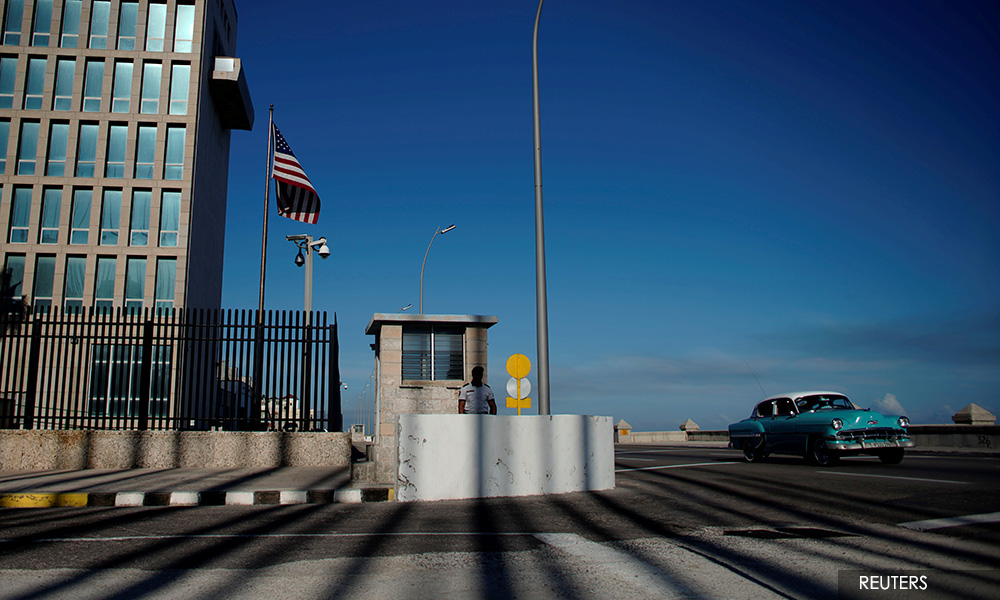Scans show changes to brains of US embassy workers in Havana
Advanced brain scans of US embassy employees who reported falling ill while serving in Havana revealed significant differences from a control group, according to a new study published on Tuesday.
The finding does little, however, to resolve the cause of a string of mysterious health incidents that led the administration of US President Donald Trump to withdraw many personnel from Cuba.
University of Pennsylvania researchers said symptoms described by the embassy workers may be reflected in their brain scans when compared with those of healthy volunteers.
The difference “is jaw-dropping at the moment,” lead researcher Dr Ragini Verma, a professor of radiology at the university, told Reuters in a phone interview.
“Most of these patients had a particular type of symptoms, and there is a clinical abnormality that is being reflected in an imaging anomaly,” she said.
However, in findings published by the Journal of the American Medical Association, Verma and her colleagues said it was not clear if the brain patterns directly translated into meaningful health problems. Initial MRI scans of 21 Havana embassy workers had revealed no abnormalities.
In a statement, the Cuban government said the study was not coherent with previous ones and only served to muddy the picture further. It said it also did not help get any closer to the reason for the ailments reported by the diplomats.
A US State Department spokesperson said, ”The department is aware of the study and welcomes the medical community’s discussion on this complex issue.”
The health problems of more than two dozen workers surfaced in 2016 after the administration of former President Barack Obama reopened the embassy in an effort to improve relations with the Communist-run island nation.
Most of the employees were removed from Cuba in 2017.
Symptoms included headache, ringing in the ears, sleep disturbances, trouble thinking, memory problems, dizziness and balance problems.
Trump (photo) has said Cuba was responsible for what the US State Department called “significant injuries” suffered by the workers.
Canadian embassy workers complained of similar mysterious health problems and were also removed from Cuba. Cuban officials have denied any involvement.
In an earlier Journal of the American Medical Association report, the university team described the injuries experienced by the first 21 diplomats it examined as like a concussion without a blow to the head.
Some researchers have questioned whether the study findings are significant.
“Finding evidence of brain change doesn’t provide evidence of brain injury or damage,” said Dr Jon Stone, a professor of neurology at the Centre for Clinical Brain Sciences at the University of Edinburgh, who was not involved in the study.
Dr Sergio Della Sala, a professor of human cognitive neuroscience, also at the University of Edinburgh, noted that 12 of the affected workers, who had a history of concussion prior to going to Cuba, were included in the analyses.
“In comparison, none of the controls declared previous brain injury. This in itself could cause statistical group differences,” Della Sala said.
Sceptics have challenged State Department assertions that some unknown weapon had attacked the workers.
For example, the odd sound that some felt may have caused the problems was later identified by insect experts as the mating call of the male Indies short-tailed cricket, which is notorious for its volume.
Johana Tablada, deputy director for North America at the Cuban Ministry of Foreign Affairs, told reporters in Havana that there was no evidence that it was a deliberate attack, two years after the investigation was opened.
“Cuba asks the US government to put an end to the manipulation of this issue as a pretext to impose more measures of aggression against the integrity of our country, this economy and the Cuban people,” she said.
- Reuters
RM12.50 / month
- Unlimited access to award-winning journalism
- Comment and share your opinions on all our articles
- Gift interesting stories to your friends
- Tax deductable

